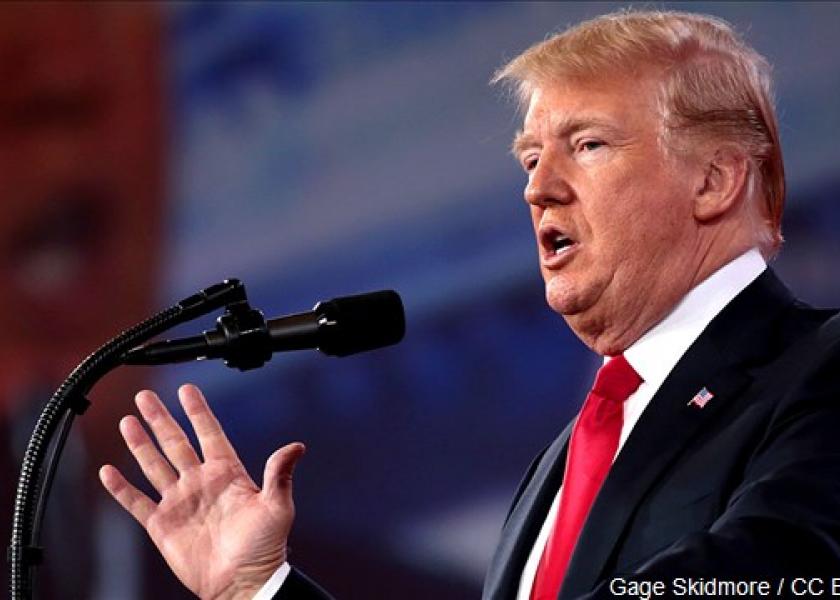UPDATED: Trump promises new tariffs on Mexico

(UPDATED, May 31) President Donald Trump has promised a series of escalating tariffs on Mexican imports if the U.S. southern neighbor doesn’t do more to stop undocumented migrants crossing to the U.S.
“If Mexico does not take decisive measures, it will come at a significant price,” Trump said in a May 30 statement on the White House website.
The promised move, sure to complicate approval of USMCA if Trump follows through, would begin with a 5% tariff on all Mexican goods on June 10. Trump said the tariff was justified to address what he called the emergency at the southern U.S. border.
“I am invoking the authorities granted to me by the International Emergency Economic Powers Act,” Trump said. “If the illegal migration crisis is alleviated through effective actions taken by Mexico, to be determined in our sole discretion and judgment, the tariffs will be removed.”
However, Trump said if the crisis persists, the tariffs will be hiked to 10% on July 1, 15% on Aug. 1, 20% on Sept. 1 and 25% by Oct. 1.
“Tariffs will permanently remain at the 25% level unless and until Mexico substantially stops the illegal inflow of aliens coming through its territory,” Trump said in the May 30 statement. He said workers who come to the country through the legal admissions process, including those working on U.S. farms and other businesses, will still be granted passage to the U.S.
Pushback
Trump’s move was criticized by the Fresh Produce Association of the Americas, a group representing importers and distributors of Mexican produce.
If the 25% tariff level is reached in October, Americans will be paying an extra $3 billion for avocados, tomatoes, mangoes and other fruits and vegetables, the group said in a news release.
“This is a tax on healthy diets, plain and simple,” FPAA President Lance Jungmeyer said in the release. “With the obesity epidemic, this is completely unacceptable and counterproductive in dealing with the migrant issue at hand.”
FPAA said USDA statistics show that Americans consume $12 billion in Mexican fruits and vegetables every year.
“The latest threat from the president will harm American consumers and U.S. businesses first and foremost,” Jungmeyer said in the release. “This takes us backwards as a country and threatens USMCA passage at a critical time in moving this agreement forward.”
The Border Trade Alliance, a group supporting trade with Mexico, said in a statement that the new tariffs proposed by trumps are “totally and completely unnecessary.”
“Establishing tariffs on our friends, neighbors, and trading partners is exactly the wrong policy to pursue, alliance chairwoman Paola Avila said in the statement. “The president’s plan, if executed, will do tremendous harm to our relationship with Mexico, to our country’s ability to adopt new trade agreements going forward, and to U.S. consumers, who will be the ones who will pay for these tariffs.”
Trade moves
The announcement by Trump come about two weeks after the U.S. lifted tariffs on imports Mexican steel and aluminum, easing trade tensions that have simmered since last spring. Mexico responded May 20 by dropping its 20% retaliatory tariffs on U.S. apples, which had been in place since June 2018
There is continuing friction in the U.S.-Mexican tomato trade, however.
Mexican tomatoes are now subject to a 17.56% duty after the U.S Department of Commerce on May 7 terminated the 2013 Suspension Agreement on Fresh Tomatoes from Mexico, restarting a dumping investigation on Mexican tomatoes that was suspended in 1996, when the first five-year suspension was inked. While Commerce Department officials said in early May they were optimistic for a new suspension agreement with Mexican tomato growers, it has been elusive so far.
Jungmeyer said the U.S. 17.5% duty on tomatoes could raise U.S. consumer prices between 40% to 85%, according to an analysis from Arizona State University economists.
Additionally, Jungmeyer said in the release that fruit and vegetable growers from Florida and Georgia have convinced lawmakers in their states to withhold votes on USMCA unless Congress passes a Marco Rubio-led bill that would add even more duties or tariffs on Mexican produce.
“This is going to be a drain on Southwest border communities, where employers have already cut jobs due to other moves by the Administration to put pressure on the border,” Jungmeyer said in the release.
Related articles







